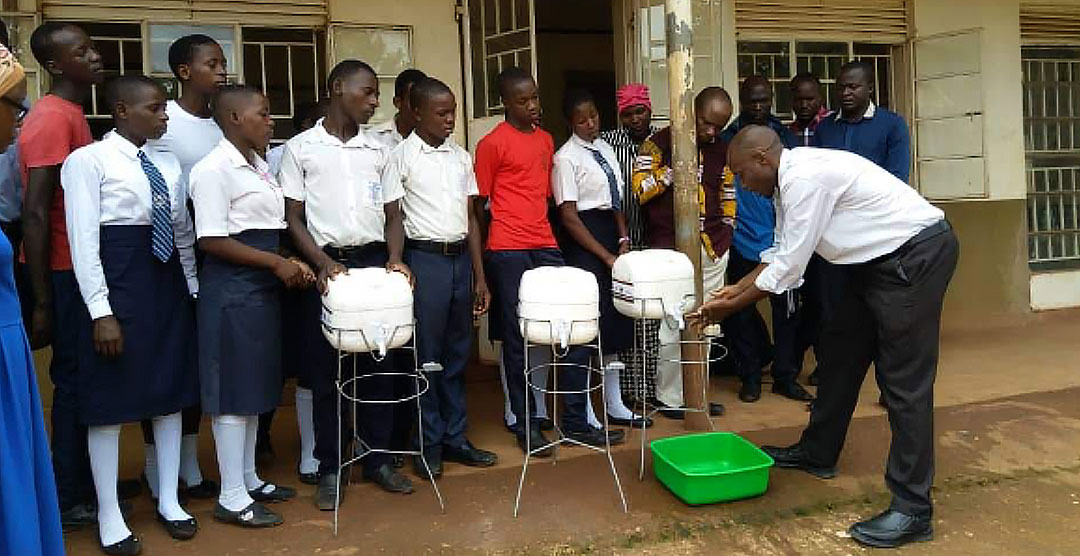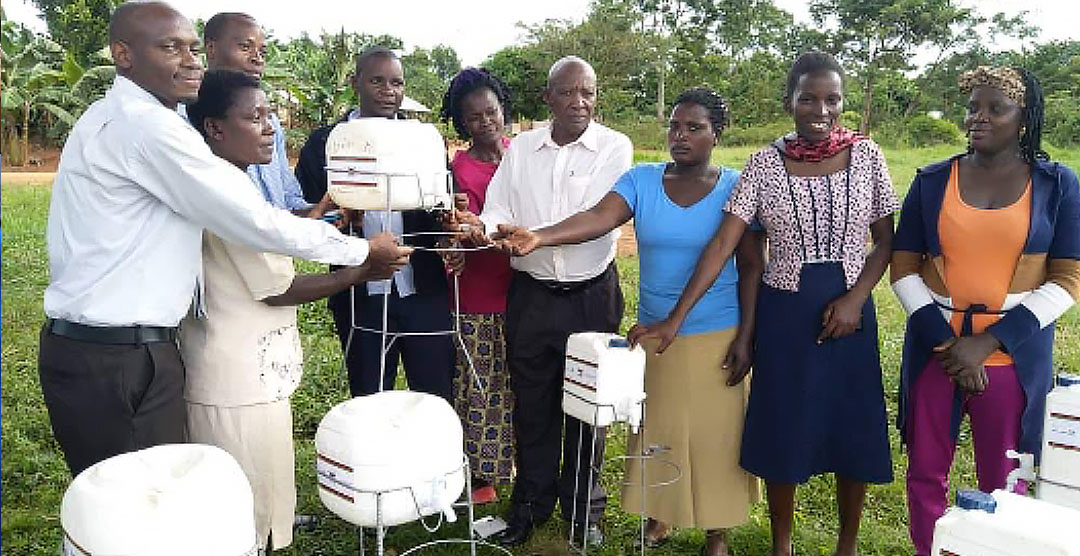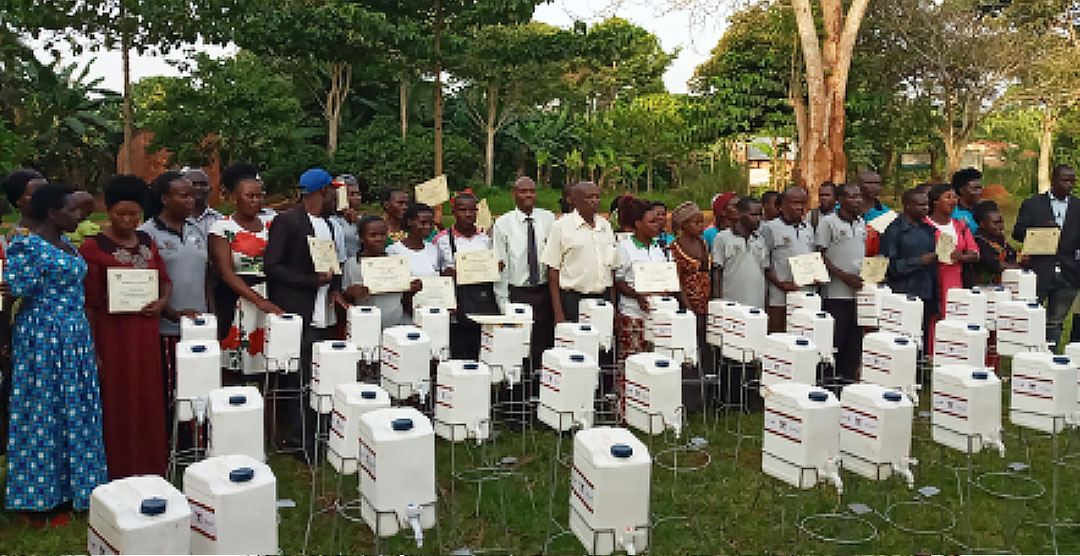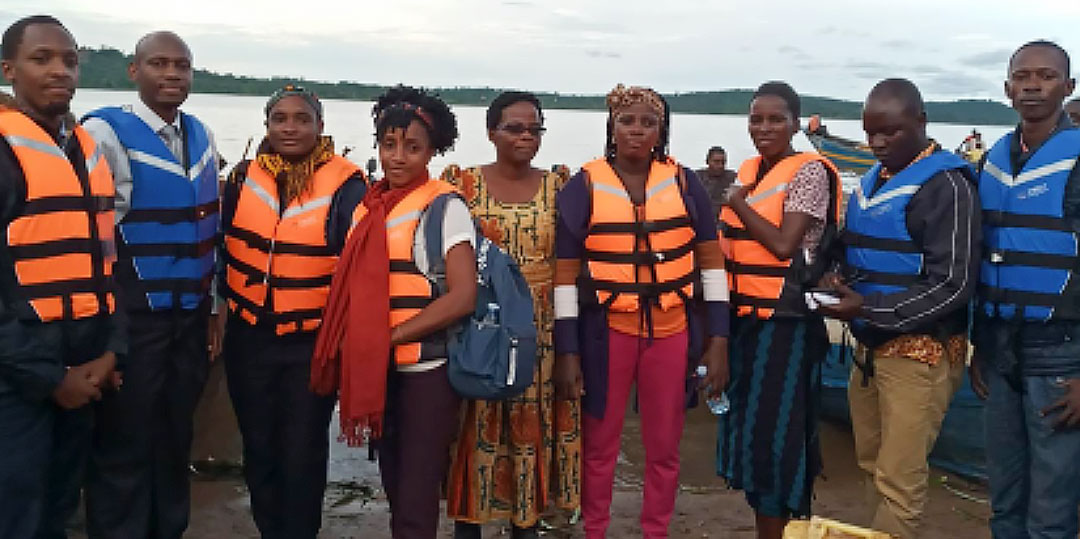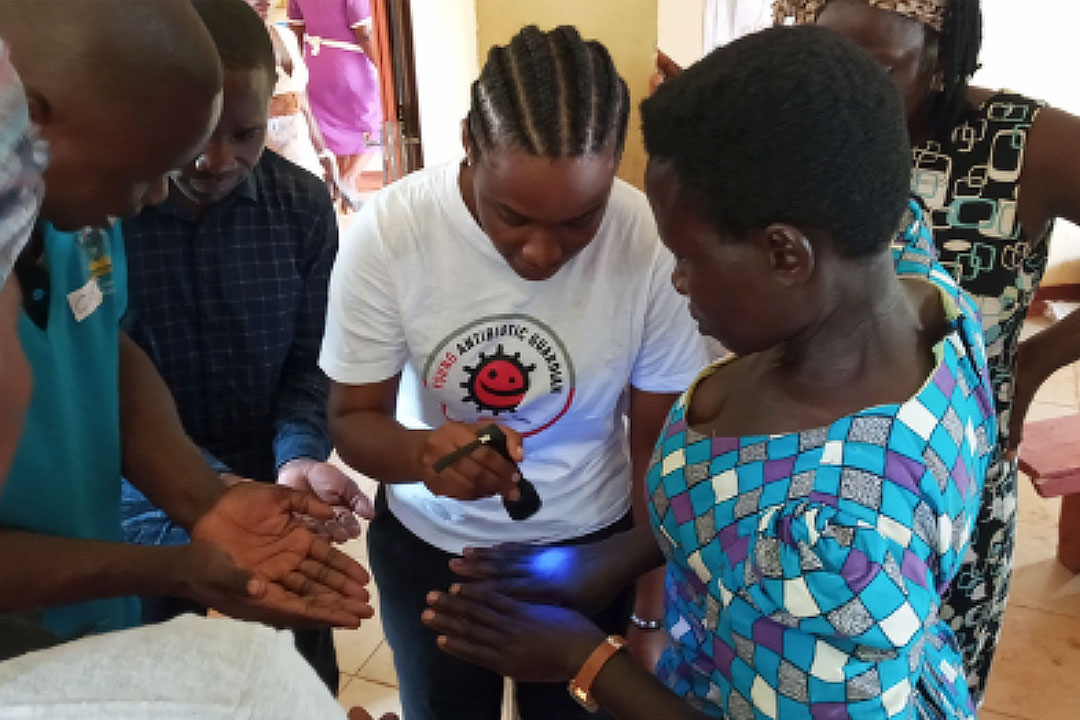
Grace Biyinzika Lubega (white t-shirt) from MakSPH checking for traces of the Glo Germ gel on the hands of the CHWs using an ultra-violet torch.
In recent years, there has been an increase in hospital and community acquired infections globally. Scientists all over the world have continued to emphasize the importance of hand hygiene as one of the most effective methods of prevention and control of infectious diseases including resistant microbes. Recently, Makerere University School of Public Health (MakSPH) in partnership with Pharmacy Department, College of Veterinary Medicine, Animal Resources and BioSecurity (COVAB), Nottingham Trent University (NTU), Buckinghamshire Healthcare NHS Trust (BHT), the Ministry of Health, and Wakiso District Local Government trained over 200 Community Health Workers (CHWs), locally known as Village Health Teams (VHTs) in Kajjansi town council, Wakiso district on antimicrobial stewardship (AMS) with emphasis on Infection Prevention and Control (IPC) practices particularly handwashing. This training was conducted as part of a project on AMS funded by the Commonwealth Partnerships for Antimicrobial Stewardship Scheme (CwPAMS), an initiative of Commonwealth Pharmacists Association (CPA) and Tropical Health and Education Trust (THET) under the Fleming Fund of the UK Department of Health and Social Care (DHSC).
Following these trainings, Buckinghamshire Healthcare NHS Trust (BHT) with support of the Commonwealth Pharmacists Association spearheaded a fundraising campaign using crowd funding that raised resources to extend the reach of AMS and IPC activities to other areas of Wakiso district. In early March 2020, a team from Makerere University School of Public Health (MakSPH) led by Dr. David Musoke (Lecturer, Department of Disease Control and Environmental Health) trained all CHWs on Bussi and Zzinga islands on Lake Victoria in Wakiso district on IPC practices with emphasis on hand washing with soap. This training was timely given the current COVID-19 pandemic, with handwashing a critical prevention method against this disease which has infected over 470,000 people and led to more than 21,000 deaths globally, as recommended by the World Health Organization (WHO) and Ministry of Health (MOH).
The CHWs were taught the importance and proper hand washing technique which was further illustrated with the Glo Germ gel experiment. In addition to the training, every CHW was provided with a hand washing facility which included a plastic jerry can and metallic stand.
Bussi Secondary School, Zzinga Health Centre II, Bishop Kauma Zzinga Primary School, and selected local leaders also received hand washing facilities. During a session at Bussi Secondary School, Dr. Musoke sensitized students on infection prevention practices such as hand washing with emphasis on its importance in the prevention of the Corona virus among other diseases.
The Zzinga Health Centre II in-charge Ms. Christine Wanyana greatly appreciated Makerere University and partners for considering island communities for health promotion interventions.
“Thank you Dr. Musoke and your team at Makerere University. We also want to extend our sincere appreciation to the UK colleagues particularly Buckinghamshire hospital and the Commonwealth Pharmacists Association that led the fundraising for these handwashing facilities. Our VHTs have been empowered and I am sure they will be change agents in our communities. We are also grateful for the cleaning equipment that has been given to our health centre to improve sanitation.” Ms. Wanyana said.
The CHWs were very happy to have been empowered with not only knowledge but also provided with facilities with which to wash their hands as a means of improving sanitation and hygiene within their communities.
One of the CHWs said: “I am happy that I will have this handwashing facility in my home. Other members of the community will learn from me how to wash their hands. I am also pleased that we have been the first CHWs to be selected to receive these hand washing facilities in the entire Busiro South constituency despite the remoteness of these islands.”
During the handover of the hand washing facilities to the CHWs, Mr. Stanley Kabuye, the LC III Chairperson of Bussi sub county, Wakiso district emphasized how these hand washing facilities will help in the fight against diarrheal diseases and the emerging Corona virus. As Dr. Musoke addressed the CHWs, he thanked them for the tremendous work they do, and encouraged them to be proud of their contribution to the health system despite being volunteers.
“Don’t think you are not making an impact in our country. As VHTs, you do a lot of work to promote health and prevent diseases in your communities. You go to people’s homes and educate them about health issues, which cannot be by done health workers who are primarily based at health facilities, among other numerous roles you play. You therefore contribute significantly to the overall health of the community and your sacrifices as volunteers make a very big impact within the country.” Dr. Musoke emphasized.
The capacity building on IPC was conducted after a 2-day training of CHWs on non-communicable diseases in partnership with Nottingham Trent University, UK with funding support from the Global Challenges Research Fund (GCRF) / Research England.
The field team before travelling by boat to the islands - left to right: Filimin Niyongabo, Dr. David Musoke, Grace Biyinzika Lubega, and Joviah Gonza (MakSPH); Christine Wanyana, Aidah Nakate, and Doreen Nabwire (health practitioners / trainers); and Henry Bugembe and Henry Kajubi (field mobiliser


